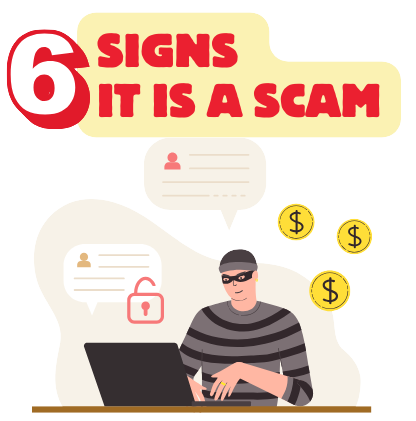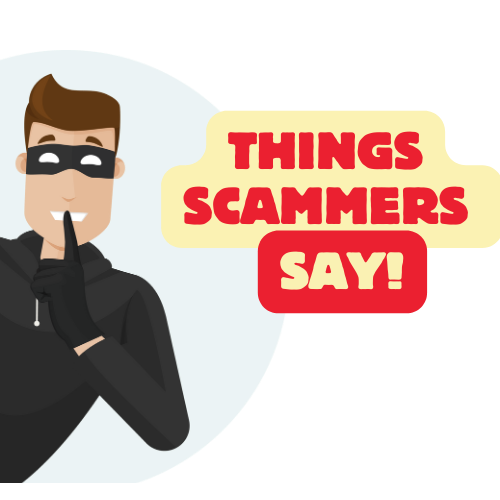Be Aware of Scams
ISSS wants you to be aware of scams that sometimes target international students and scholars.
What are scams?
Scams are illegal schemes aimed at stealing money from you. Scammers impersonate government agencies or companies and use fear tactics to threaten you into paying them or sharing your personal information, such as date of birth, social security number, bank account or credit card information, etc.
Who to contact?
If you're unsure about a call contact the UMD police or the ISSS Office.
Message from UMD Division of Technology
Be Vigilant Against These Scam Tactics
UMD's Division of Information Technology (DIT) and other UMD units will never ask you to enter your username, passphrase, and Duo passcode into a Google Form or other online form. This list of scams and phishing messages contains more about this and other types of common scams targeting the UMD community. Additionally, please note that if you receive a Duo multi-factor authentication request when you are not actively trying to log into a UMD system, it means that someone already has your Directory ID and password. If you encounter a form asking for login details or other sensitive information, or if you receive a Duo MFA request while you’re not trying to log in, please stop and contact the IT Service Desk to report the issue.
Current Scams and Phishing Emails
Scammers...
1. Contact you out of the the blue
2. Claim there is an emergency
3. Ask for your personal information
4. Want you to wire money
5. Tell you to keep it secret
6. Make it sound too good to be true

Types of Scams
Criminals often use “spoofing services” to choose the number or name that shows up on your phone. The call may appear to come from a government agency, from a consulate, or from the FBI or the police, but it actually does not. These calls are fake or “scam” calls. There are many types of scams but below are some that commonly target international students and scholars.
Scammers pretend to be from government agencies like DHS, ICE, Social Security Administration, and IRS — or say they’re an official from the student's/scholar's home country. They contact you and say that, if you don’t pay or give them your personal information, your immigration status is at risk or you will be deported.
What You Can Do
If someone says they’re from a government agency and threatens you, or demands money, they’re a scammer. Don’t pay them or give them any personal information. Hang up, block the call, delete the message and meet with ISSS about any immigration concerns you have.
If you are unsure go to or call the UMD police or ISSS Office.
Beware of companies offering a job in the United States from overseas or by email. If you receive a suspicious job offer by email for which you did not apply it may be a scam, especially if you are asked to pay money to receive a job offer. If you see a job offer on social media, make sure the company is legitimate before sharing any of your personal information.
Talk with an ISSS advisor (designated school official) before you take any job/internship.
What You Can Do:
Track the jobs you are applying for. Ask questions! Investigate the company making the offer. Call the department and ask questions about the job offer. Do not deposit checks that you receive in email. These offers are unsolicited, meaning the student did not initiate contact, the scammer did.
Scammers send emails and create social media pages and websites that claim to be affiliated with government agencies. Make sure the website or email address ends with .gov.
What You Can Do
Don’t click on any link. Don’t pass it on to others. Delete the message.
Scammers will send fraudulent emails/letters to Visa Lottery applicants in an attempt to extract payment. While Diversity Visa(DV) applicants may receive an email from the U.S. government reminding them to check their status online through DV Entrant Status Check, they will not receive a notification letter or email informing them that they are a successful DV entrant.
What You Can Do
Applicants can only find out if they were selected to continue with DV processing by checking their status online through the DV Entrant Status Check at https://dvprogram.state.gov.
Sometimes businesses and websites pretend to be immigration experts or say they have special connections to the government. They might also “guarantee” that you can get a visa, Green Card, or work permit faster if you pay a fee. Remember, only USCIS can determine whether to expedite processing.
What You Can Do
Visit USCIS' Check Case Processing Times webpage for current processing times. For employment-based petitions, there are premium processing times posted for Forms I-129 and Form I-140.
Phone Scams can take any form but all involve a threat then a request for money. Some common robocalls spoof the following organizations:
- Law enforcement officials from your home country indicate you are the subject of a criminal investigation and must pay to avoid arrest or deportation.
- Immigration and Customs Enforcement (ICE)- threatening deportation
- Internal Revenue Service (IRS)- threatening arrest for back taxes
- Courthouse or Law Enforcement Agency (such as the FBI or the police) - threatening arrest for a crime
- Customs and Border Protection (CBP) or scammers pretending to be officials from your home country - stating that a package with your name on it containing illegal materials has been intercepted.
What You Can Do:
HANG UP. Do not allow the caller to transfer you. Delete the text message. Block the number. Do NOT engage with Robocalls. If you are worried about a situation, contact the appropriate agency yourself to verify if the call is legitimate.
In a common housing scam, students are asked to put one month’s rent and a security deposit down on for housing that does not exist.
What You Can Do:
Look at the housing unit in-person. If you cannot see the housing unit yourself, ask the person for a live zoom walk-through. Photos and videos can be faked. If it seems too good to be true, it might be a scam. Visit UMD's Off-Campus Housing for a list of resources. If you are concerned that a housing offer might be a scam, contact Student Legal Aid.

Things Scammers Say!
- “Act now!”
- “Only say what I tell you to say.”
- “Don’t trust anyone. They’re in on it.”
- “Do [this] or you’ll be arrested.”
- “Don’t hang up.”
Additional Resources:
- Learn more about telephone scams and telephone scammers’ techniques by visiting Federal Trade Commission-Telemarketing-Scams.
- USCIS has provided information on their website at USCIS Avoid Scams.
- If the caller is pretending to be from the FBI, you can file a complaint through the FBI’s Internet Crime Complaint Center
